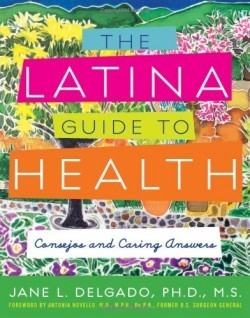The Latina Guide to Health
Consejos and Caring Answers
Latinos are impacting American society in undeniable ways. As the diverse Latino population in the United States grows, the Latino community has increasingly taken on an identity of its own, and social issues are framed according to the needs of the culture. This is also the case with healthcare. In her new book, Jane L. Delgado offers the Latina—often the primary caregiver and decision-maker in the family—a basic manual for maintaining her own health and that of the family. The Latina Guide to Health addresses a wide spectrum of concerns not only having to do with physical health, but also emotional and spiritual well-being.
At the heart of this book lies the acknowledgement that Latinas, operating in complex social circles that are both satisfying and taxing, are different from other social groups. It is not always easy to balance the various demands placed on the Latina woman; this requires a unique approach to Latina health. Delgado points out that although it is easy to make the health of other family members a priority, Latinas can best meet the needs of their community when they are taking care of themselves.
Juggling multiple roles is something Delgado knows about first-hand, as a practicing clinical psychologist and the president and CEO of the National Alliance for Hispanic Health, the country’s largest organization of health and human service providers for Hispanics. The fact that she is a Latina herself gives the book a particularly “Latina-to-Latina” intimacy. Delgado uses easy-to-understand language to give advice, tell personal stories, and explain modern scientific breakthroughs, so she may win the applause of those who are overwhelmed by health books filled with complicated medical jargon.
Women reading this book will encounter suggestions for following the basic components of good health. Delgado reminds the reader, “Our mind, body, and spirit are integrated.” Topics include: wellness visits, eating good-for-you foods, sleeping soundly and sufficiently, getting fit, promoting clean air and water, and nurturing relationships and faith. Throughout, sidebars containing consejos (advice) or stories told by real Latinas are inserted with the added effect of helping to personalize the issues being discussed. For example, one sidebar in a fitness discussion is a radio caller’s complaint: “I am too tired when I get home from work [to exercise].” Periodically, the author will also insert a quote from a documented source or a warning to avoid something damaging.
A thoughtful section on the best way to take care of others applies the how-to guide to the rest of the family, especially children, and discusses issues that include scheduled medical visits, feeding loved ones the correct diet, and what kind of television to allow children to watch. This advice is based on documented scientific findings, according to the author, and for many Latinas these consejos may be welcome. The only quibble is that at times Delgado becomes somewhat preachy about the minutiae of child rearing—something that not every capable mother may appreciate.
Delgado does a good job of providing basic information on the key ailments plaguing the Latino community, such as diabetes and high blood pressure, with special consideration for her female audience. The book’s second half offers a layman’s encyclopedia and glossary of diseases and conditions of particular concern, including issues relating to sexuality and pregnancy. Delgado explains each condition, the process of diagnosis, whether or not the condition can improve (and how), and resources for reliable information. While many of the main chronic and problematic social illnesses (such as STDs) are addressed, the list falls short of offering a good review of the range of mental illnesses. The exception here is depression, which the author does cover.
The Guide finishes off with a battery of final remarks about the importance of end-of-life issues and the need to think ahead about one’s last wishes. Also included is a useful set of forms to help the reader keep track of doctor visits, medical tests, personal health history, and the like.
The Latina Guide to Health contains important information while still feeling like “light” reading. Perhaps this is due to its conversational nature or its bits of nonjudgmental advice. In any case, while it is written for Latinas, any woman could benefit from reading Delgado’s work. Also available in a Spanish-language edition (Guía de Salud: Consejos y Respuestas 978-1-55704-855-4).
Disclosure: This article is not an endorsement, but a review. The publisher of this book provided free copies of the book to have their book reviewed by a professional reviewer. No fee was paid by the publisher for this review. Foreword Reviews only recommends books that we love. Foreword Magazine, Inc. is disclosing this in accordance with the Federal Trade Commission’s 16 CFR, Part 255.

